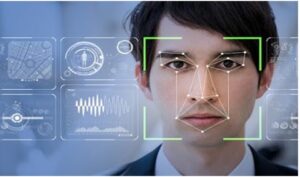Artificial Intelligence in Smartphone
Artificial Intelligence is the base for many current applications. Nowadays AI has become the central part of smartphones and it goes far beyond applications. Now smartphones are introduced with powerful AI chips that can perform so many operations per second and along with that, it required less power to complete the task. With AI, these phones offer features ranging from Face ID to enhanced reality. AI is used to improve image quality, enabling digital image post-production editing.
 Fig. 1:Artificial Intelligence in Smartphone
Fig. 1:Artificial Intelligence in Smartphone
“Artificial Intelligence (AI) features will become an important product differentiator for smartphone manufacturers that will help retain existing users and gain new customers. As the smartphone market shifts from selling technology products to providing an engaging and personalized experience, AI solutions running on smartphones will become an essential part of the vendor roadmap over the next two years.”
Companies spend billions on mobile advertising to better understand the behaviour of their customers. While more companies are investing in mobile advertising, these companies are still looking for the ability to better target customers with better user data and contextual offers.
FUNCTIONS OF ARTIFICIAL INTELLIGENCE FOR SMARTPHONE
- Voice assistant
The most obvious example of AI on a cell phone is the voice assistant. No matter what family your smartphone belongs to, if you have an assistant like Siri or Google Assistant, you have artificial intelligence. Voice recognition and synthesis are clear examples of this technology. Now they also have the outstanding data processing power. They can read emails, surf the internet, give suggestions, run applications, and even get ‘creative’ with their comments.
 Fig. 2:Voice Assistant
Fig. 2:Voice Assistant
- Smart photos
Artificial intelligence allows you to take more beautiful or blurred portraits in the background. It is necessary to create a detailed map of the scene using the same footing as your eye for the next period. This effect cannot be generated by a single camera, so it requires very intelligent software capable of achieving this. Software that doesn’t care if you’re a professional photographer and captures great images for us.
- Object recognition
The emergence of virtual reality and its infinite applications opened up another scene for AI action. Has the ability to track the movements of objects, identify them in real-time, and perform related processes.
Scene recognition captured by the camera is one of the more obvious applications of the use of artificial intelligence. For example, some tools recognize a variety of scenes, including cat or dog images, sunsets, text images, blue sky photos, and snow scenes. That is, regardless of facial recognition, which can identify the people you see in the photos you take.
- Hardware for Artificial Intelligence
Chips are commonly referred to as neural engines, and the truth is that all information processing depends on them. This is why most advanced phones have hardware optimized to support the whole process required by AI, i.e. they are designed for faster data processing.
- AI makes the decision
You may not know it directly but AI helps you make decisions. It is estimated that a person watches their phone for more than 2.5 hours a day and makes about 35,000 decisions over 24 hours. Algorithms with artificial intelligence and machine learning ‘set’ from users ’habits and tastes through data sets, which they then convert into notifications through various applications such as transport or music applications with just a few mentions.
- Battery saving
Google uses a machine that gives all smartphone users a great battery experience. Artificial intelligence will pay attention to how you use your smartphone and then in the next few hours you can find the statistics of the apps you are using and you will never use them again. It categorizes applications that use four standby buckets from ‘Active’ to ‘Rare’. Over-application applications will replace overtime buckets, and non-inactive applications may face some restrictions.
- Face Unlock Security
Apple launched Face Unlock in September 2017. Combined with Apple’s extensive hardware, the iPhone Paul iPhone X uses an AI-based algorithm for your face unlocking system. Using the AI procedure, the phone can easily identify a user’s face, even with facial changes such as glasses or a beard. Google recently announced a radar-based, hands-free gesture to combat unlock. With its hands-free system, unlocking the phone will be easy, fast, and secure. It claims to be able to unlock the phone in almost any orientation.
 Fig.3: Face Unlock Security
Fig.3: Face Unlock Security
- Enables real-time translation
Many translation apps enable translation. However, most of these apps do not work without the internet. AI can enable your smartphone to translate into different languages in real-time without the need for an internet connection.
Like the digital versions of what interpreters do, artificial intelligence can provide a simultaneous translation tool that can translate phrases quickly. This means that the user can set the distance between the spoken word and the translation. This is useful for special languages that take longer to translate well.
- Enhances search engines
You’ve seen something you like to buy but you don’t know what it says or how to find it. Even if you don’t know the words in that description, Visual Search helps you find the words you want. Smartphones are the best launchpad for visual search technology. Google Lens is an example of this.
In some cases, visual search is more accurate and faster than voice or text search. By integrating AI into mobile applications, Android developers are committed to developing image recognition systems and voice recognition systems.
Conclusion
AI makes smartphone users’ life easier than traditional mode. It’s only getting better with time. AI introduces innovative possibilities in the mobile app industry. With the help of AI in smartphones business will increased. AI is the future of mobile app development. The world has high expectations of artificial intelligence. This is something that will rule the market tomorrow. While this is only the beginning of what we are witnessing today, the best practices in AI are yet to come shortly.